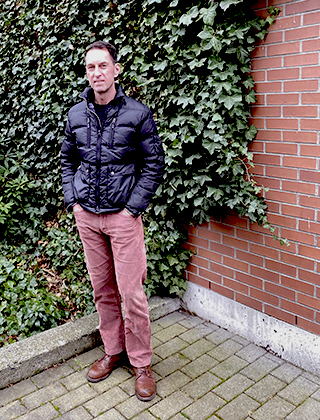 HC: What drew you to that program?
HC: What drew you to that program?
RT: After graduating from Colonel Gray High school, I briefly attended Acadia University but didn’t find what I was looking for. Then in 1983, by chance, I enrolled in the Urban and Rural Planning program at Holland College, not being completely sure what urban planning entailed. The instructors, Percy Simmonds and Ernie Morello, were fantastic. Something immediately clicked for me and urban planning made sense. I really appreciated getting a full understanding of the basics of urban infrastructure and how a city works and functions, such as water, sewer, garbage disposal, subdivision, rezoning, new construction.
HC: Tell us a bit about your journey following graduation?
RT: After receiving my diploma from Holland College, I went on to complete a degree in Urban Planning at the Nova Scotia College of Art and Design. Following graduation from NSCAD, I returned to Charlottetown and worked alongside my former instructor, Ernie Morello, who at that time was running a small landscape architecture and planning office on Water Street called Morello and Associates. The bulk of our work was centered on revitalizing the waterfront, which in those days was not an inviting or attractive area. Institutional work such as schools, hospitals, private residences, and parks rounded out the majority of our contracts. Five years later, the economy was starting to ebb, and it seemed like a good time for me to explore beyond the Maritimes.
After watching a TV show on CBC that suggested the City of Victoria on Vancouver Island in British Columbia had such a mild climate and that winter essentially didn’t exist, I felt certain that Victoria was the destination for me. In those days, there was no internet to help arrange employment from afar. So, I went to the local telephone company, and they conveniently had phone books from towns and cities across the country. Out of all the architectural addresses within the Victoria phone book, I sent five letters indicating that my credentials were in urban planning, and I was relocating to Victoria. Amazingly, within two weeks I received a letter back from an architecture and planning firm that was looking for a lead planner to design and develop an 18-hole golf course and housing development. I took the job, and what followed were commissions for various new schools, a Vancouver courthouse redesign, as well as resort developments throughout BC.
After an action-packed five-year run, the economy slowed again, and I moved into government planning. After ten years with municipal and regional government, I came to a fork in the road where I had to decide if this work represented the remainder of my career, or if there was more that I wanted to be pursued.
I opted to pursue more, and I applied to Harvard University for my masters. After studying extensively for the Graduate Record Examinations and assembling a fulsome portfolio, I wasn’t expecting a positive outcome, but to my surprise I was accepted. Then I had to come up with $60,000 for tuition and housing, relocate to Cambridge, Massachusetts, and once again leave behind everything familiar. Although a little terrifying and intimidating at times, the experience was amazing and as my confidence grew so did the results. I graduated in 2003 with Distinction – Masters in Housing and Community Development.
HC: Where did your journey take you after from Harvard?
RT: After graduating, I returned to Vancouver Island and opened my own consulting firm, Tinney and Associates. For 14 years I focused on adaptive reuse of historic buildings, subdivisions, new condo developments, and everything in between. Our firm offered a full suite of services including financing, design, approvals, project management, sales/leasing, and strata management.
In 2016, the BC provincial government approached me with an opportunity to oversee all heritage properties owned by the government. With approximately 400 buildings to oversee and maintain, and a staff of 16 people, my current role as Director of the Heritage Branch has taken me to all corners of the province. I have had a fantastic 40-year career that all started at Holland College.
HC: In what ways did your time at Holland College aid you during the span of your career?
RT: My class size at Holland College was quite small, which allowed for a lot of one-on-one opportunities to discuss details and ask questions. In larger group settings, you don’t get that luxury. The hands-on learning approach that I experienced at Holland College ensured I was both well-equipped and well-informed to move forward into my career.
HC: Do you have a favourite memory from your time at Holland College?
RT: My favourite memories are working with and learning from Ernie Morello. He was able to bring real world experience to the program as a practicing consultant, which complemented the academic material provided by Percy Simmonds.
HC: Do you have a piece of advice you would give new alumni entering the workforce?
RT: My one piece of advice for anyone entering the workforce is to never shy away from a challenge, and to make a point of getting to know everyone within the organization. You will often find you have more in common with your colleagues than you initially thought, and it can be a great and rewarding learning experience.